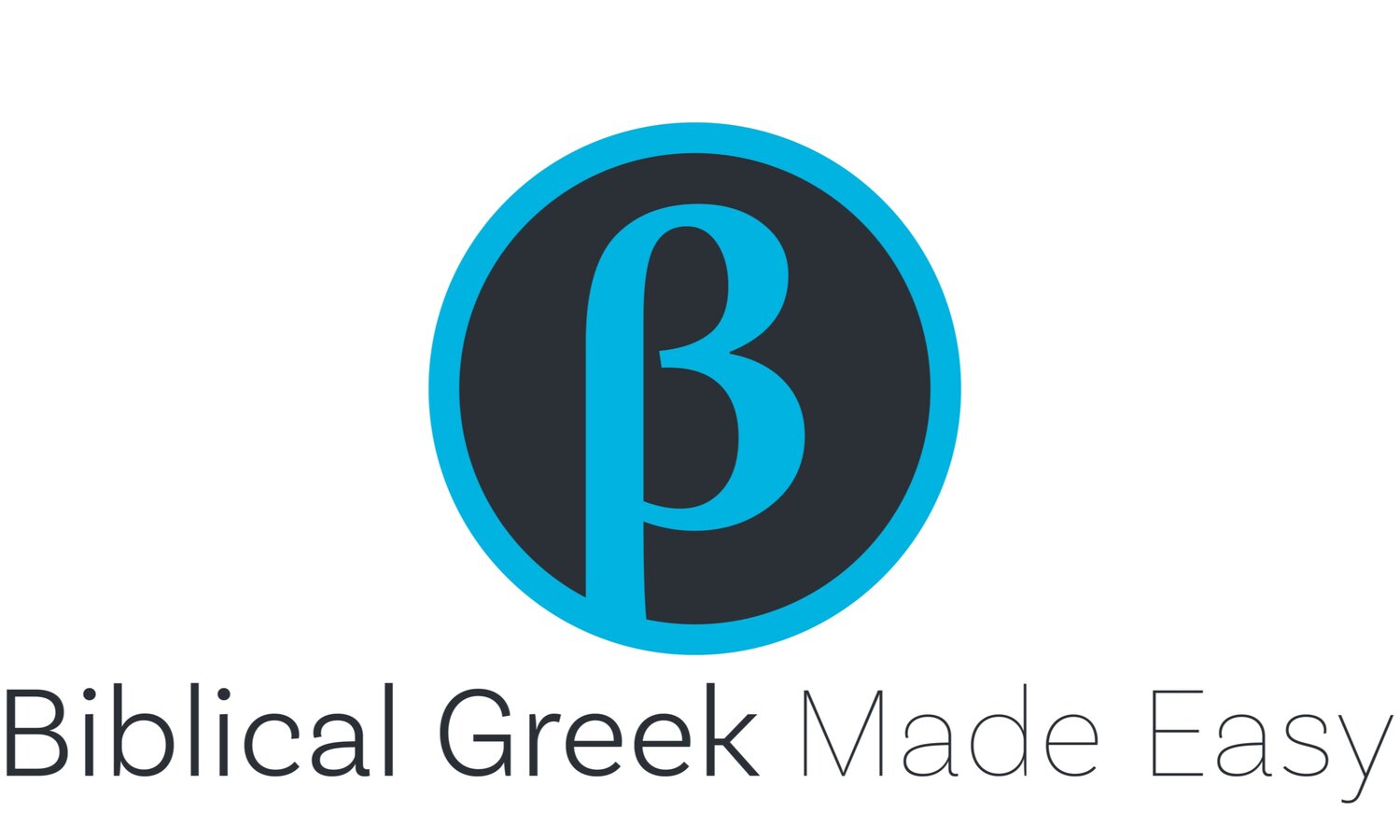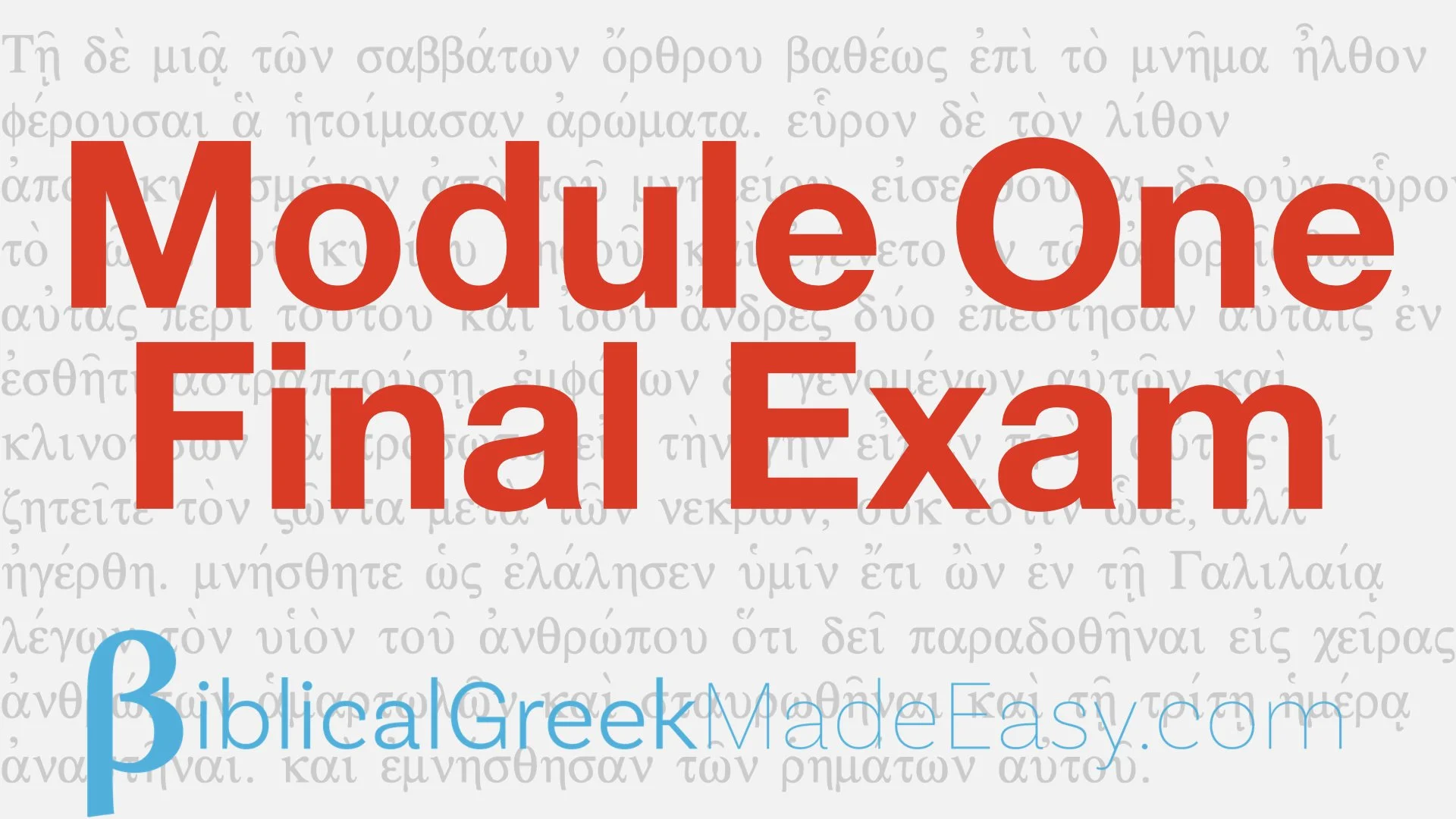Module 1: Beginning Greek
Class 1: Alphabet and Pronunciation
This video covers the alphabet, punctuation, pronunciation and other basics for starting Greek. Think of this as your first few days in the course, learning what you need to know to get started. Practice to make sure you have these basics down because it all builds on these elements.
Video: Learn the Greek Alphabet in less than 10 min by Math-U-See
When you’re ready, try Quiz 1
Note: Here is the answer key for all the Module1 quizzes. Only use what you need, and don’t look ahead to spoil tings for yourself, but this can help you check your work as you go.
Class 1 Vocabulary
Here is all of the vocabulary for class 1, reviewed and pronounced for you.
For full vocabulary list, click here.
“Do not despise these small beginnings, for the Lord rejoices to see the work begin.”
— Zechariah 4:10
Class 2: Nominative and Accusative
We begin nouns, learning the basics of the Greek noun system as well as the first two and most basic cases: nominative and Accusative.
Week 2 Vocabulary
For full vocabulary list, click here.
Bonus Video: Nominative and Accusative
In this bonus video, we practice noticing nominative and accusative nouns in John 1:1 in the Greek New Testament!
Link: Biblehub Greek Bible
Class 3: Genitive and Dative
In class 3 we continue with nouns and learn the next two cases: genitive and dative. These cases round out the four case system we encounter in Greek. We also learn the definite article, an absolute must for the Greek student. I cannot emphasize enough how important it is to master classes 2 and 3 before moving on, because those cases and endings are foundational for everything else we do.
Bonus Video: Genitive and Dative
We practice reading and translating New Testament Greek in John 1!
We recommend trying to translate on this practice sheet first, and then watch the video to walk through the translation and see how you did!
“Whatever you do, work heartily, as for the Lord and not for men, knowing that from the Lord you will receive the inheritance as your reward. You are serving the Lord Christ." — Colossians 3:23-24
Class 4: Prepositions and εἰμί
We learn prepositions, those small (and sometimes frustrating words) that help us connect words and ideas. We also learn our first verb, the “to be” verb that is the most basic in any language.
Bonus Video: Prepositions and εἰμί
We keep reading the Greek New Testament in John 1, translating verses 6-10. Here is the link to this week’s practice.
Class 5: Adjectives
Having covered that basics of nouns, we move to the primary noun modifiers, adjectives. There are three kinds of adjectives we learn which allow us to create more complex sentences in Greek.
In this week’s bonus video we practice adjectives. Here is the worksheet to do on your own before you watch the video.
“So, whether you eat or drink, or whatever you do, do all to the glory of God.” — 1 Corinthians 10:31
Class 6: Third Declension Nouns
In this class we learn a new type of noun that follows a different pattern than we have seen: the third declension. These are important to learn because they show up again and again in. the New Testament.
We continue to translate John 1, doing verses 11-18, and notice 3rd declension nouns along the way. Here is the practice sheet.
Class 7: 1st and 2nd Person Pronouns
Having mastered nouns, we move to a few classes on pronouns.
“Let the favor of the Lord our God be upon us,
and establish the work of our hands upon us;
yes, establish the work of our hands!”
— Psalm 90:17
Class 8: αὐτός
This class is all about “autos,” a small word that has a lot of usage and power in Greek.
We practice αὐτός in a bunch of different sentences! Here is the worksheet to try for yourself.
Class 9: Demonstrative Pronouns
This video covers demonstrative pronouns, which are the words “this” and “that” in english. We learn their Greek counterparts and how to use them correctly.
We translate John 1:19-28 together.
“And let us not grow weary of doing good, for in due season we will reap, if we do not give up.”
— Galatians 6:9
Class 10: Relative Pronouns
In this final class of module 1, we learn relative pronouns, one of the least understood features of English grammar. We learn how to use them in both English and in Greek.
Feel like you’re ready to take the Final Exam? Click Here.
This is all translation, and it should be all grammar and vocabulary that you know up to this point. Take your time and have fun!
Complete Module 1? Get your certificate.
You have worked hard! Be sure to celebrate that with an official Biblical Greek Made Easy certificate of completion for Module 1: Beginning Biblical Greek. Click here.
Module 1 Review
In this video we do a quick flyover of where we have come these last 10 lessons and look ahead with some tips for module 2. When you’re ready, thy the translation exam here.
“"I have fought the good fight, I have finished the race, I have kept the faith." — 2 Timothy 4:7



















